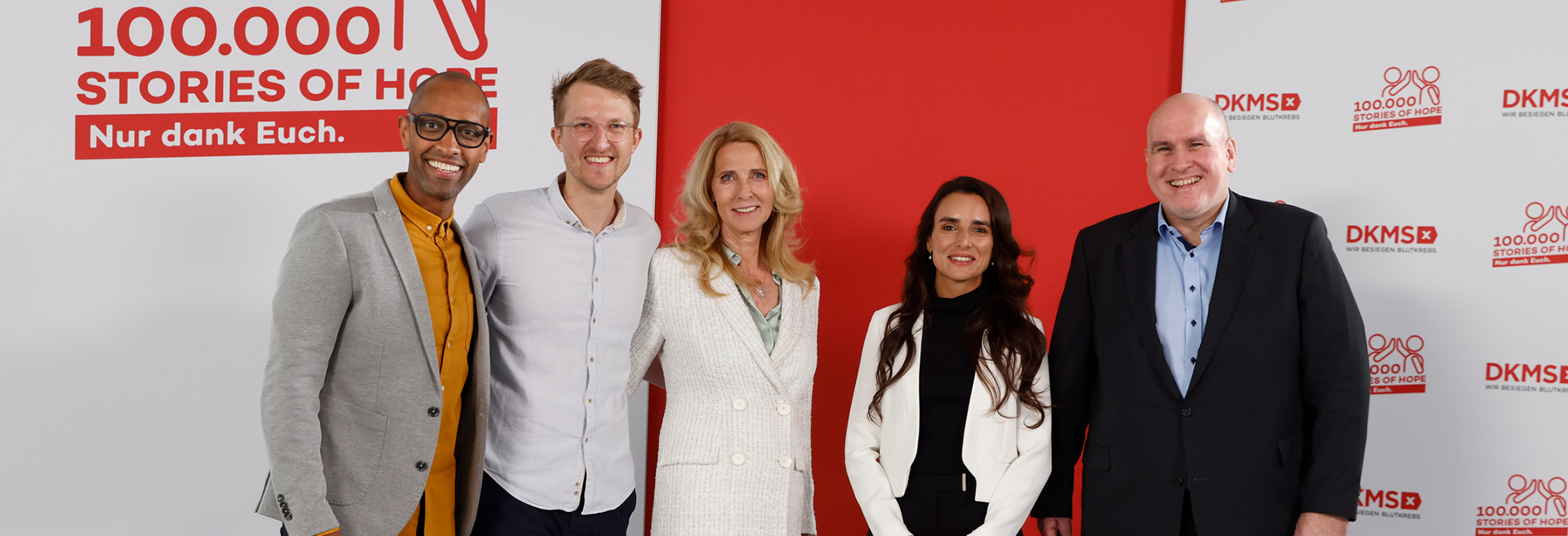We celebrate 100,000 second chances at life
DKMS celebrates a significant milestone in the organization’s history: 100,000 second chances at life provided to patients with blood cancer or other blood disorders. For the international nonprofit organization, this wonderful accomplishment is far more than a number or a benchmark: every single second chance at life represents a patient and their personal story.

100,000 second chances at life are a powerful reminder of the impact the organization’s work has on patients, their families and friends. “It is what motivates us every day in our life-saving mission,” says Dr. Elke Neujahr, Global Chief Executive Officer at DKMS. “Every 27 seconds someone in the world is diagnosed with blood cancer. Every year thousands of families hear the heartbreaking news that their loved one will need a blood stem cell transplant to survive. 100,000 second chances at life are thus a strong signal of hope for all those facing the toughest moment of their lives.”
Saving lives is a team effort
The work of registering donors and facilitating transplants is inherently a team effort and every life saved is due to the collaboration, dedication, and passion of every single individual involved along the way: Every donor who has given a patient a second chance, every one of the
11 million potential donors who are registered with DKMS and provide hope to patients in need, and the countless volunteers who are dedicated to creating a world without blood cancer. “We also honor all patients and their families and friends as well as all physicians and nurses, who take the best possible care of patients and who are such an essential part of this process. Only together we can make a big impact in the lives of patients across the globe,” says Dr. Elke Neujahr.
Ethnic diversity saves lives
100,000 second chances at life is also an impressive achievement that only becomes more impressive, when considering that it took DKMS 24 years to reach 50,000 second chance at life in 2015. Within just seven years the organization has now doubled that number. DKMS was only able to accomplish this so quickly because the organization expanded its footprint and is now active in seven countries on five continents. Every day, 21 DKMS donors from Germany, the USA, Poland, the UK, Chile, South Africa, and India, donate blood stem cells for patients all over the world. Blood stem cell donations from DKMS donors have given people in 57 countries a second chance at life.
One crucial factor in the success of a blood stem cell transplantation is the degree of match between the tissue characteristics of donor and patient. Since tissue characteristics vary according to both genetics and region, the organization is doing everything possible to register as many donors of different ethnicities and nationalities as possible. Having a genetically diverse database of donors is necessary to ensure that all patients have the chance to find their match. “We thus continue to work on our expansion, as well as forming crucial partnerships across the world. We will not stop until every patient, regardless of where they live, is able to find the lifesaver they need,” says Dr. Elke Neujahr.
Improving patients’ outcome
The only effective way to address blood cancer and other life-threatening blood disorders is with a macro perspective. Innovative scientific research is a key factor to improve the healing chances for patients. “We constantly optimize our own work, conduct our own clinical trials and invest in research projects on an international level to make blood stem cell transplants a lasting success for patients. Our research focuses on three key areas: the optimization of our donor pool, advancing donor selection, and improving cell therapy and transplantation,” says Dr. Alexander Schmidt, Global Chief Medical Officer at DKMS.
DKMS support programs for patients from low- and middle-income countries
To improve the situation of patients in low- and middle-income countries, DKMS has also expanded its efforts to increase the access to transplantation. “If we want to prevent families from suffering the loss of a loved one, we need to help, where help is needed! For the second chance at life, we cross borders, collaborate globally and leave no stone unturned to help patients. Every patient with blood cancer or a life-threatening blood disease deserves that chance. Thus, we have established several support programs to increase the access to transplantation for patients living in emerging countries,” highlights Dr. Elke Neujahr.
Reaching 100,000 second chances at life is an incredible accomplishment. However, the organization’s work will not be done until every patient in need of a transplant gets that second chance. “It is my vision for DKMS that we will have 20 million donors registered with us and that we will be active in 20 countries by 2030 to celebrate 200,000 second chance at life,” says Dr. Elke Neujahr.